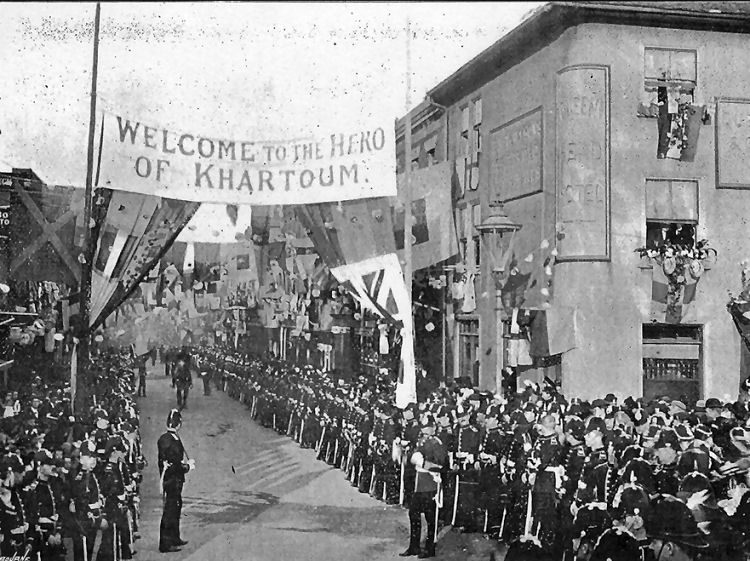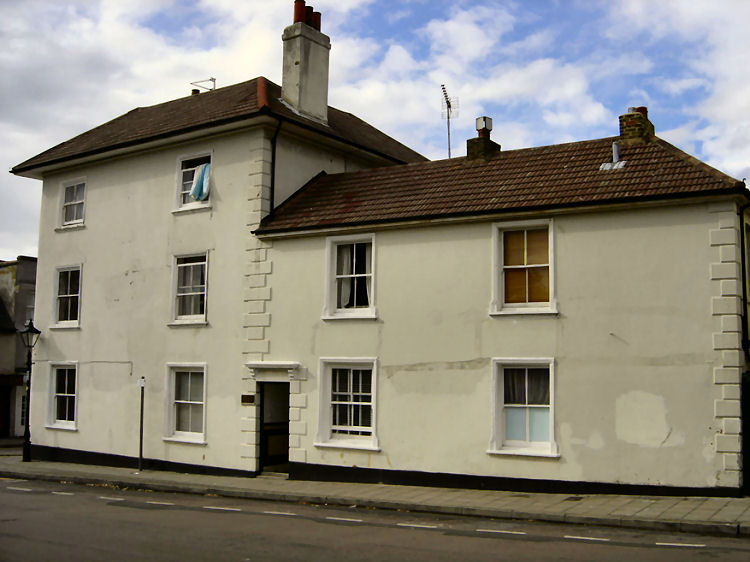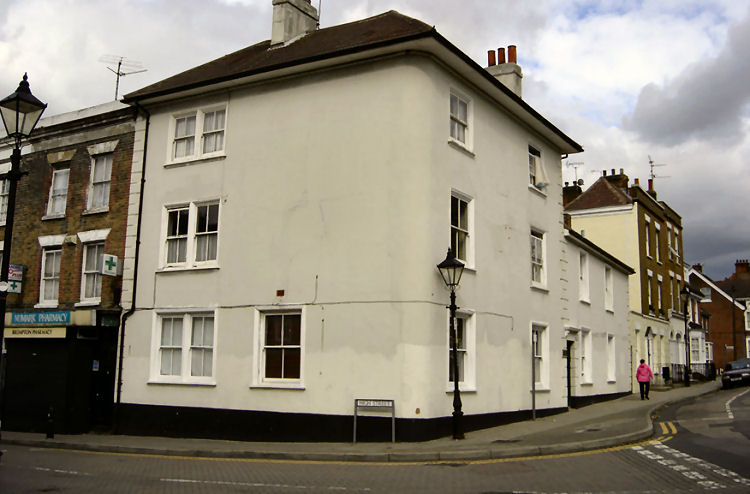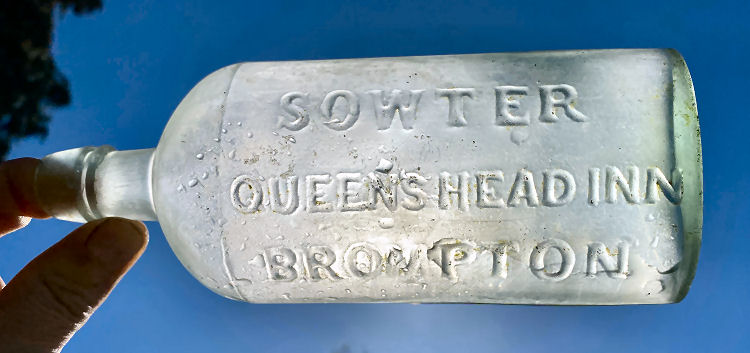|
1 High Street (Brompton Road 1828) (Garden Road 1861 ) )
Old Brompton

Above photo 1898, from www.Flickr.com
by Ben Levick. Crowds waiting for the arrival of the procession during
the visit of Lord Kitchener to Brompton on November the 8th 1898. The
Queen's Head public house is clearly visible on the corner. Photo by
Charlesworth of 3 High Street, Brompton. |


Above photos 19 June 2010, from www.Flickr.com
by Ben Levick. |

Above bottle, circa 1860, kindly sent by Simon Bourne. |
From the 1700s until at least 1930 this was the Queen's Head
public house. Later it became part of the Army Benevolent Society and is now
in private ownership.
|
Research compiled by Leofwine. From
http://www.kenthistoryforum.co.uk
The Queen’s Head has been a popular inn name since the reign of
Elizabeth I, although in this case it is almost certainly named for
Queen Anne, who came to the throne in 1702. The Queen’s Head is one of
the oldest pubs in Brompton, built in the first decade of the village’s
existence. A deed in the Medway City Archives records that in 1703 John
Bigg bought the recently built ‘Queen’s Head Inn and washhouse, outhouse
yard backside boards-and-room with the little room next and adjoining
thereto.’ His widow was still in possession of the establishment in
1758, although it seems she was the owner, not the landlady. By the mid
1760s it was held by Isaac Phillips. A local diary later records:
26 June 1804 Philips who kept the Queens Head Brompton some years back
was running after a pig and dropped down dead.
In 1808 Frederick Beaumont was licensee. During the early 19th century
the ‘Nelson’ and ‘Commodore’ coaches left here for London every weekday,
and the horse-drawn omnibuses for Gravesend. In 1826 it burned down but
was rebuilt, and the local Licensed Victuallers’ Protection Association
held their annual festival here in 1859. The Brompton Hop Dinner took
place here in 1861, probably as part of the trade’s campaign for the
removal of hop duties, which happened in 1862.
In 1912 exclusive seats were kept in the beer parlour for the select
company of Edward Nelson, the auctioneer, Thomas Woolley, the stationer,
H. P. Williams, of ‘Reciprocity’ fame, Taffy Williams, the dog fancier
and W. E. Stokes, the chemist.
The licence was agreed to be transferred to a new premises (to retain
the name Queen’s Head) at the junction of Woodside and Maidstone Road,
Wigmore on 4th Feb 1935. This was confirmed on 8th April 1935 and
declared final on 16th December 1935. The Brompton premises was required
to close down on the evening of 31st January 1936. The new premises at
Wigmore opened on 2nd Feb 1936.
From the 1930s (or possibly earlier), until its eventual closure in
1954, it was a hotel for Thespians and travelling players who performed
at local theatres (presumably just an unlicenced lodging house after
1935). In 1955 it became The Royal Naval Benevolent Trust.
|
|
Kent Gazette Reports 4 January 1805.
DIED.
Wednesday died at Brompton, Mr. J. Rowe, master of the "Queen's
head."
|
|
Kentish Gazette, 4 April, 1806.
DEATH.
On Wednesday, Mrs. Beaumont, wife of Mr. Beaumont, of the "Queen's
Head, Brompton.
|
|
Kent Herald, 17 March 1825.
Death.
Last week, Mrs. Hodgskin, wife of Mr. Hodgskin, of the "Queen's Head" Brompton.
|
|
From the Kentish Gazette, 1 December 1840.
ROCHESTER AND CHATHAM.
Opening Dinner at the "Queen's Head Inn," Brompton.
On Tuesday last the opening dinner of Mr. T. M'Grath's house, the
"Queen's Head Inn," was celebrated in the large dining-room. The most
extensive and excellent arrangements were made by the worthy host to
give éclat to the celebration. At 4 o’clock a party of the most
respectable gentlemen and tradesmen of Chatham and Brompton to the
number of sixty sat down to dinner, Mr. Thomas P. J. Rowe, high
constable of Gillingham, consented to take the chair, and Mr. Rickon,
one of the Churchwardens for Chatham, officiated as vice. Amongst the
gentlemen present we observed Richard Winch, Esq., Mayor of Rochester on
the right of the Chairman, and Mr. Joseph Hopkins, on his left, Joseph
Ashley, Esq. returning officer for the Borough of Chatham, Edward
Wickham, Esq., Wm. Bryant, Esq., Mr. John Batten, Mr. T. Wells, Mr. Wm.
Hills, Mr. Attwood, Mr. R. Ashenden. Mr. John Harrison, Mr. Robt. Fond,
Mr. James Burrill, Mr. Ed. Ballard. &c., &c. The dinner consisted of
every delicacy of the season. The dessert of choice fruits, and the
wines were particularly fine, and notwithstanding there were persons in
the room professing Radical opinions, an evening of genuine relaxation
and enjoyment was secured. After ample justice had been done to the
viands, and the health of the Queen and the Royal Princess and Prince
Albert had been given and lustily responded to, the Queen Dowager’s
health being cheered most enthusiastically, the health of the Mayor of
Rochester and the Corporation was drank, and that of high constable of
Chatham and Gillingham, together with Mr. Ashley's, Colonel Beat's, and
Mr. Wickham’s. The evening was spent with the greatest hilarity, and the
party separated at a late hour highly delighted with the entertainment.
The worthy host was complimented for his taste and judgement in catering
for his guests in so superior a manner.
|
|
From the Kentish Gazette, 6 August 1844.
An inquest was held on Thursday, at the "Queen’s Head Inn,” Brompton,
before John Hinde, esq. on the body of
Mrs. Ann Coulson, who had destroyed herself on Tuesday morning, by
throwing herself into a well 140 feet deep. When taken out she was quite
dead. Domestic unhappiness is said to have been the cause of this rash
act.
Verdict, Temporary Insanity.
|
|
From the Kentish Gazette, 5 December 1848.
Sudden Death.
On Saturday. Mr. George Butcher, formerly foreman of the match makers in
the Ordnance department at Chatham, from which he was superannuated,
suddenly fell down and expired as he was about to ascend the omnibus for
Maidstone, where he had latterly resided. An inquest was on Monday
holden on the body, at the "Queen's Head," Brompton, before J. Hinde,
Esq., coroner. Death appeared to have arisen from apoplexy, and the jury
returned a verdict accordingly. Deceased was 80 years of age.
|
|
South Eastern Gazette, Tuesday 10 March 1857.
Sudden death of a soldier.
On Tuesday last an inquest was held at the "Queen's Head Hotel,"
Brompton, before T. Hills, Esq., coroner, on view of the body
of Bryan Carr, age 33, a private in the 70th regiment, quartered in the
huts at Prince Henry's Bastion, who died very suddenly on
the previous Sunday morning.
Sgt W. Welsh, of the same regiment, said the deceased had latterly been
in charge of the washing house at the huts at Brompton
Barracks. Witness slept in the same hut as the deceased. About 2 o'clock
on Sunday morning he heard a noise as of a man falling
out of bed, and on lighting the gas in the hut found the deceased lying
on the floor in a state of insensibility. Witness and another
soldier immediately placed the deceased in the bed and bathed his
temples, but were unable to get any water down his throat.
Witness started off directly to the Garrison Hospital and told the
doctor on duty there; his name, he believed, was Dr. Kelsall. He
told him that there was a man dangerously ill in the huts, on which Dr.
Kelsall inquired if the deceased had been drinking?
Witness told him he had not, on which Dr. Kelsall desired him to be
brought to the hospital. He (witness) said the deceased was
senseless, and that it would do him more harm than good to remove him,
but Dr. Kelsall desired him a second time to have the
deceased brought to the hospital. Witness told him that in that case he
should have to go either to the Brompton-gate guard, or to
the main guard, for the stretches. Dr. Kelsall made no reply, and
witness then left to procure the stretchers, but on returning to the
hut was informed that the soldier was dead. Witness proceeded once more
to the Garrison Hospital, and told the same doctor that
the deceased was dead, on which he shook his head and said "he thought
as much," and then ordered the body to be brought up to
the dead house. It was scarcely five minutes' walk from the huts to the
hospital. The doctor did not see the deceased until after he
was brought to the dead house, and then witness went to report the case
the doctor was in bed. Deceased enjoyed pretty good
health in general.
Dr. Andrew Maclean, senior surgeon at the Garrison Hospital, deposed
that he saw the body of deceased immediately after it was
taken on the dead-house, between 7 and 8 on Sunday morning. On making a
post mortem examination of the body, witness found
the cause of death to have resulted from a diseased heart and cerebral
apoplexy. In reply to the coroner, Dr. Maclean stated that
there was always a medical man on duty at the hospital to attend upon
any emergency such as the present case. From the
examination of the body, witness should say that deceased must have died
very shortly after he fell, and that no human aid could
have been of any use in saving his life. After a few observations from
the coroner, the jury returned a verdict in accordance with
the evidence of Dr. Maclean.
|
|
South Eastern Gazette, Tuesday 16 March 1858.
Death of a soldier through the alleged violence of a comrade.
On Tuesday last an inquest was held at the "Queen's Head," Brompton, on
the body of Terence Hierby, age 19, a private in the
18th Royal Irish. Before he died he made a statement to the effect that
a few days before his death her had been struck in the
stomach by private in the same regiment, named Nicholas Ryan, and on his
saying that he would report Ryan, he (Ryan) seized a
stone and struck him in the back. This was without the slightest
provocation. The stone did not hurt him, but the blow in the
stomach did very much. He vomited clotted blood, and was taken to the
hospital, where he vomited about 2 quarts of blood, and
the next day 2 more quarts. Ryan, when taxed with having struck him,
denied it altogether. Deceased died on Saturday morning
week. Dr. Mandeville, surgeon to the 3rd Battalion, made a post mortem
examination of the body, and found that the whole of the
stomach was greatly inflamed, which did not appear to be from recent
causes. It might have been from a blow given the day or
two before, but he thought it was of longer standing. He had looked for
traces of a blow in the stomach, but could not find any.
The jury returned a verdict of "Death from chronic disease of the
bowels."
|
|
From the Maidstone Telegraph, Rochester and Chatham Gazette, 12 October 1861.
Rochester and Chatham. Shocking Cruelty to an Infant, and Committal of
the Mother for Manslaughter.
On Monday afternoon, Mr. Thomas Hills, one of the coroner's of Kent,
terminated a lengthened investigation, at the "Queen's Head Tavern,"
Brompton, into the circumstances attending the death of an infant, age 6
months, name Sophia Mitchell, from the inhuman treatment and neglect of
its mother. Before the evidence was taken the jury went to view the body
of deceased, which presented the most emaciated appearance and had
evidently been grossly neglected.
Margaret Nicholas, living at the "King of Prussia," said the mother of
deceased lived there for two months without the child before she fixed
it from the workhouse. She was in the constant habit of treating it with
the greatest neglect leaving it for several hours crying by itself,
while she was away drinking. Whenever witness remonstrated with her for
her treatments towards it, she replied, "It is no business of yours."
The only food deceased had given it was a small piece of bread soaked in
gin and peppermint in a small tea cup. It never had anything else to
witness's knowledge. It was never dressed, and was only wrapped around
with an old shawl, which, a few days before it's death, was washed and
put on it half dry. The bread and gin and peppermint was given to it
once a day. The mother always appeared to have plenty of money and means
to get food, as she was in the habit of staying out till 11 o'clock at
night, and had not been sober for three weeks. When told her her inhuman
neglect of her child, she replied she wished "the ------- thing was out
of the way," adding, that when she "could get a cooks place." On the day
the child was taken ill the mother went for the doctor, and after he
came she did not remain with deceased, but went out. Deceased died the
following day.
Mary Jane Hughes also deposed to the above effect.
Elizabeth Erith, nurse to the Chatham Workhouse, deposed that the
deceased was born in the Union. The mother left with it in May, but soon
after deserted it, and it was brought back again in a very emancipated
state. A short time after the police brought the mother there, and the
deceased was fetched away.
Elizabeth Dunn said the child was brought to her to nurse while the
mother was in a situation. She was to receive 5s. per week for it; but
after keeping it several weeks, and hearing nothing of the mother, she
took the child to the workhouse. It had no clothes whatever to wear, and
was always wrapped in a shawl.
Mr. F. Seagreen, M.D. deposed to being called to see the deceased on the
evening of the 28th ult. It was then sinking fast, and was in a most
emanciated state, with nothing on it but an old stinking shawl. The body
was covered with marks of vermin, and altogether in a most filthy
neglected state. Witness go special directions for it to be supplied
with nourishments, especially drinks. It was then evidently near its
death. The mother was present and appeared to be sober. He had no doubt
that death was occasioned by neglect and the want of proper nourishment;
in fact from sheer wasting away.
The coroner briefly addressed the jury, going over the evidence, and
pointed out the law respecting manslaughter.
The jury, after deliberating about 5 minutes, returned a verdict of
"Manslaughter against Helen Mitchell," the mother, and the coroner
immediately issued his warrant for her apprehension and committal to
Maidstone gaol to await her trial at the next assizes.
|
|
Kent Times, 10 May 1862.
BROMPTON. Death from Fighting.
An inquest was held at the "Queen's Head" on Wednesday week, before
T. Hills, Esq., coroner, on the body of William Johnson, a private
of the 46th Regiment.
It appeared from the evidence, that in the
evening of Wednesday, the 16th of April, deceased fought with a
marine, named Brown, at the "White Lion Inn." Brown had his
collar-bone broken, while the deceased appeared at the time to be
very little hurt. The next day he was taken ill, and on the
following Thursday he died. Assistant Staff Surgeon Madden, under
whose care deceased was placed, stated that death was caused by
erysipelas in the head, the consequence of a scalp wound. The wound
in itself was very slight, but the intemperate habits of the
deceased had predisposed him to erysipelas. The inquest was
adjourned for the attendance of Brown.
|
|
Maidstone Telegraph. 5 June 1869.
Robbery at an hotel.
Rebecca Murphy was charged with stealing, at the "Queens Head Hotel,"
Brompton, on the 31st May, one dress, four pairs stockings, a petticoat,
chemise and other articles valued at £3 5s. the property of Harriet
Sowter and another.
Mary Ann Smith wife of a soldier, said she managed business carried on
by Mr. Sowter at the "Queens Head Hotel," Brompton, she had seen the
prisoner as a customer at the bar of the hotel; on Monday evening last
shortly before 8 o'clock she saw the prisoner standing in front of the
bar in company with a man and woman and remained there with them until
shortly before 9; she did not go out of the house but went along the
passage towards the interior of the house; the prisoner returned past
the bar door and she noticed that as she left the house with a man and
another woman that she appeared to be very confused; very soon after the
prisoner left she went upstairs to her bedroom and on entering she saw
that the wardrobe was open - that door was locked up but the key was
left in; she felt sure that the prisoner had stolen something and
communicated her suspicions to Miss Sowter and they afterwards examined
the wardrobe and she messed a dress, petticoat and apron belonging to
her; the property was worth 25s. some other property belonging to Mr.
Sowter was afterwards missed; as soon as she found out that a robbery
had been committed the police were sent for.
Harriet Sowter said she resided at the "Queens Head Hotel," Brompton;
she knew the prisoner as a customer; on the 31st May she saw the
prisoner after standing in front of the bar for some time pass through
to the back of the house and on her returning to go out she observed
that prisoner was very confused; in consequence of what Miss Smith told
her she went up into the bedroom and looked into Mrs. Sowter's drawer,
she missed the quantity of linen belonging to Mrs. Sowter, and which she
had put away safe herself about 12 of the same day, the articles
produced by the police were her property; the brooch and earrings
produced by the police were also her property but she did not miss them
until they were shown to her by the inspector of police. The value of
the property belonging to her, and produced by the police, was £2.
Inspector J. E. Smith said on the 1st June he went and made enquiries in
Brompton respecting the robbery, and from information he received he
went, accompanied by Sergeant Freed, to the married soldiers quarters,
in St. Mary's Barracks, where he saw the prisoner. Police sergeant Freed
said there had been a robbery at Mr. Sowter's, and that she (prisoner)
was suspected of having stolen the things; the prisoner said she had
nothing but what belong to her. He and Sergeant Freed then searched the
room, and, concealed in the bed on which the prisoner slept, he found
the earrings and brooch, in the box he had produced. He then charged the
prisoner was stealing the linen and other articles. The prisoner became
very violent, and he took her into custody and brought her to the
station. The prisoner told him that a man name Moss gave her the box
with the brooch and earrings.
Police Sergeant Freed said he accompanied inspector Smith to Brompton on
the 1st June, and went with him to the place where prisoner was lodging.
He told prisoner she was suspected of committing and robbery at the
"Queens Head Hotel," on the previous evening, and that they intended to
search the room to see if there there was any of the property there. The
prisoner said she had got nothing but our own things their. He asked
Mrs. Wood, who was in the room at the time, who the large box standing
in the corner of the room belong to, and Mrs. Wood told them that it was
the prisoners box. The box was locked and he asked prisoner for the key,
and she gave it up to him after some persuasion. On opening the box he
found the whole of the articles stolen, with the exception of the
jewellery, wrapped up in a petticoat. The Prisoner was then taken into
custody.
Hannah Wood said her husband was a private soldier in the 27th regiment,
residing in the married quarters at St Mary's Barracks. On the 22nd of
May she employed the prisoner to do some work for her as she was engaged
to go out nursing an officer's lady who was unwell; on the 13th of June
she was at home in the morning about 10 o'clock, when the police came,
and she saw the inspector take the small box containing the jewellery
from out of the bed on which Mrs. Murphy (the prisoner) has slept on the
previous night; she also saw the policeman take the linen articles from
a box belong to the prisoner.
The prisoner said she was not guilty of stealing the things; she got
them from an officers servant, who told her that they were his wife's
property, and that he had just released them from the pawn office; he
asked her to take care of them for him, as she was going to the "wake"
of a man named Shelton who have died that day; she locked the things up
in her box, and then went to the "wake" herself; she knew nothing at all
about the things being stolen until the police came on Tuesday morning.
The Magistrates committed the prisoner to take her trial of the next
quarter sessions for the County.
|
LICENSEE LIST
BIGG John 1703-15+
SMART Robert 1754-55
BIGG Mrs 1756
WHITE Thomas 1756-57
BIGG Dorothy (Widow) 1758
WHITE Mr 1758
DAY William 1758-61
DAY Elizabeth (Widow) 1762-63
PHILLIPS Isaac 1766-69+
ROWE J Mr to Jan/1805 dec'd
BEAUMONT Mr 1806+
WILCOCKS Thomas 1828+
 (Brompton Road)
(Brompton Road)
HODGSKIN John 1825-40+
 
M'GRATH T Mr 1840+
SOWTER Robert 1849-77+ (age 43 in 1851 ) )
SOWTER Elizabeth 1880
STEVENS Mary A 1881+ (manageress age 32 in 1881 ) )
SOUTER Mrs Elizabeth 1882
SAVAGE William 1890-1911

CRITCHELL Joseph Ashley 1913-16
RUSSELL Gertrude Mrs 1918
RUSSELL Edward 1919-21
RUSSELL Gertrude Mrs 1922
RUSSELL Edmund 1922-23
NICHOL Victor 1924
RUSSELL E F Mrs 1925
HOOD Robert 1926-27
BLACKMAN Russell Thomas 1928
ROOTS Edwin Charles 1928
MUSSON William C 1930
GIBBENS William Charles 1931-11/Apr/32
DOBBY Benjamin Harry 11/Apr/193231/Jan/36
Closed as a licensed premises 31 Jan 1936 as a pub and transferred to
Wigmore, but appears to have remained as a lodging house in Brompton until
1954.
HOLBEN Arthur S 1938-51
https://pubwiki.co.uk/QueensHead.shtml
 From the Pigot's Directory 1828-29 From the Pigot's Directory 1828-29
 From
the Pigot's Directory 1832-33-34 From
the Pigot's Directory 1832-33-34
 Census Census
 From the Kelly's Directory 1903 From the Kelly's Directory 1903
|



